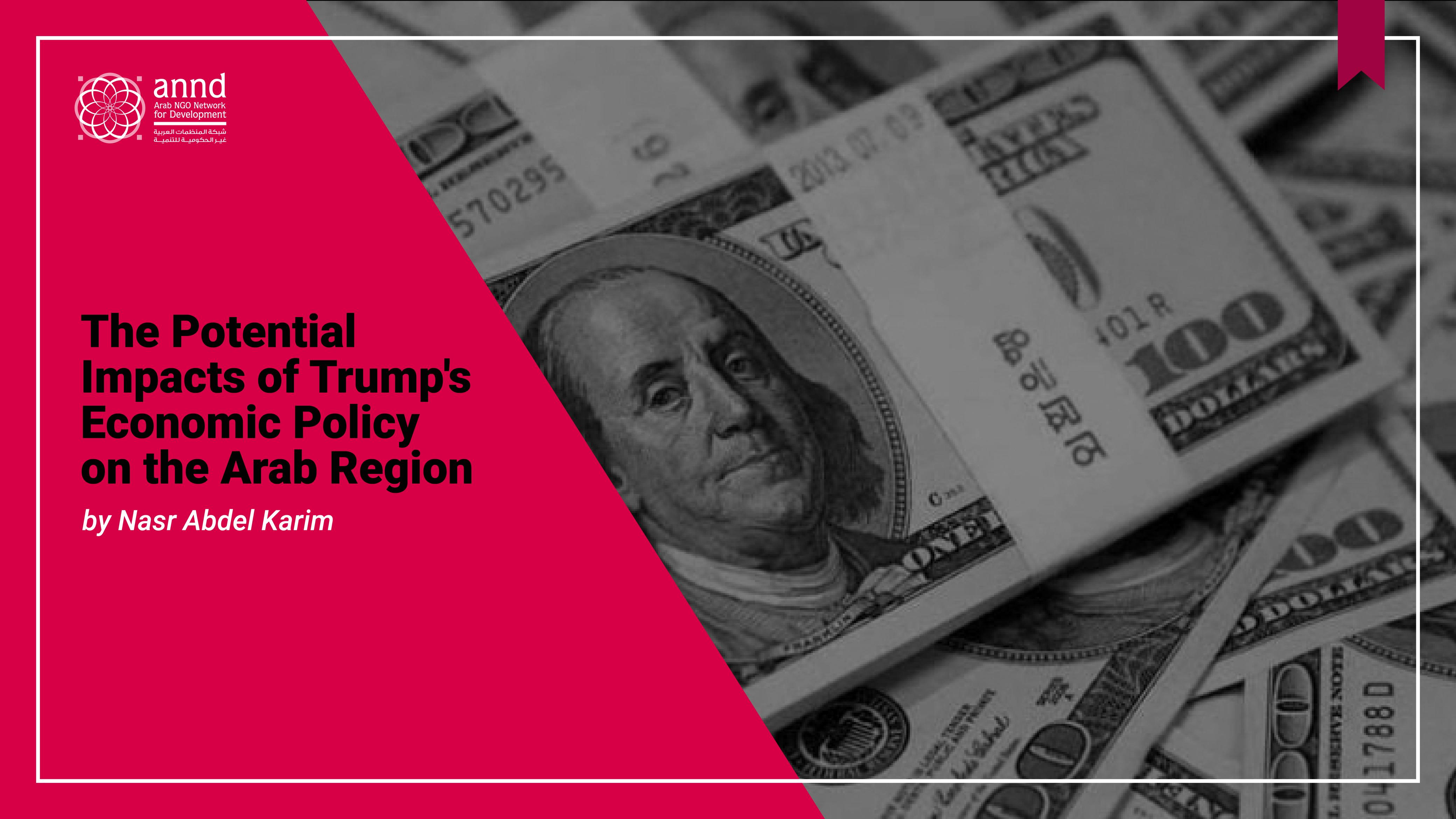The Potential Impacts of Trump's Economic Policy on the Arab Region - Nasr Abdel Karim
Less than a hundred days after Trump's inauguration as US President, he plunged the global economy into a major crisis, no less severe than the global financial crisis that had its effects extend for years since its eruption in September 2008. At the beginning of April 2025, Trump fulfilled his pledge to US voters to raise tariffs on imports of goods from almost every country in the world, based on 50% of what these countries impose on their imports from the US, with a minimum of 10%.
Two months before the announcement of the decision, which he called "Liberation Day," US President Donald Trump began implementing his economic vision of imposing tariffs on several countries, starting with Canada, Mexico, and China. The target of these tariffs is China, as tariffs on its exports to the US rose to 145% as part of a tit-for-tat response. China, meanwhile, raised tariffs on its imports from the United States to 85% as part of a reciprocal measure. Thus, it can be claimed that what is unfolding is a fierce "trade war" between China and the United States, which will lead to a restructuring of the global economy and the reformation of trade alliances and blocs worldwide.
This decision included several Arab countries, with the percentage of this increase varying between 10% for imports from the following countries: the United Arab Emirates (UAE), Egypt, Saudi Arabia, Morocco, the Sultanate of Oman, Bahrain, Qatar, Lebanon, Sudan, Yemen, and Kuwait. Higher rates were imposed on other countries, reaching 20% on Jordan, 28% on Tunisia, 30% on Algeria, 31% on Libya, and 39% on Iraq. Syria was the most heavily affected, with customs duties amounting to 41%.
The preceding comes as part of confronting what Trump described as an unfair trade imbalance, referring to the volume of imports and exports in trade with the United States. He expressed optimism that the new tariffs would lead to an American industrial "renaissance," create massive job opportunities, halt the country's commercial exploitation, and generate financial revenues for the US Treasury estimated at $700 billion annually. From a strategic perspective and through this strict protectionist policy, Trump seeks to undermine the efforts of the BRICS group, led by China, to reduce the United States' dominance over the global economy and the dollar's dominance over the currency market. Many view this Trumpian policy as a structural reversal of the globalization and economic liberalism that were led by US efforts in the first half of the 1990s.
Trump's policy included other harmful measures, such as withdrawing from and halting funding for several international agreements and organizations, and ending US assistance to numerous developing and emerging countries, including several Arab countries, which had previously received aid through the United States Agency for International Development (USAID), which was completely shut down. Undoubtedly, these measures will have direct repercussions for many countries that benefit from US funding, whether for international humanitarian organizations or their own budgets.
Following US President Donald Trump's announcement of tariffs on exports to the US from certain countries, questions arose regarding their potential impact on the global economy, including the economies of Arab countries. These tariffs sparked a wave of concern among investors about their potential repercussions for the global economy's future. This was immediately and directly demonstrated by the loss of trillions of dollars in stock markets worldwide in the first three days after the announcement, the severe turmoil in bond markets, the decline of the dollar against major currencies, the unprecedented rise in the price of gold, and a decrease in oil prices to below $60 per barrel.
This policy is expected to lead to a slowdown in global economic growth and global trade by 1% and 0.7%, respectively, which will further pressure the populations of most countries, including shrinking job opportunities, declining wage levels, and a surge in inflation. Naturally, the populations of the less developed and more fragile countries in the South will be the most affected by this policy, as experience from previous global crises has demonstrated.
In the context of this trade war between the world's major economic powers, an important question arises: What is the impact of this war on Arab citizens? In other words, who will bear the brunt of this Trumpian policy?
The economies of Arab countries primarily depend on the import of equipment and machinery from abroad, whether for the medical, military, industrial, or agricultural sectors, to varying degrees depending on each country and its specific circumstances. Therefore, the Arab economy and citizens will be directly or indirectly affected by this trade war.
According to the Office of the US Trade Representative, total trade in US goods with the Middle East and North Africa region reached an estimated $141.7 billion in 2024. The export of US goods to the MENA region in 2024 totaled $80.4 billion, while total US imports of goods from the Middle East and North Africa region reached $61.3 billion in the same year.
Trump's economic direction will have potential negative impacts on the rights and interests of citizens in the Arab region. They cannot be ignored and include:
More expensive goods and products, thus increasing the cost of living and raising inflation
When the costs of raw materials and imported goods rise due to tariffs or global price fluctuations, companies must increase the prices of their services and products to maintain their profit margins. This price increase will make services and goods more expensive for Arab consumers. Consequently, consumers will face increased living costs, which will contribute to higher inflation rates in Arab countries. The process is known as "imported inflation," as global economic fluctuations in prices affect local economies and exacerbate the suffering of citizens in Arab countries.
Impact on Households and Businesses
With rising prices of essential goods such as food and medicine, households will be forced to re-prioritize their spending, directing their resources toward their most essential needs. This change in consumption patterns will significantly impact the quality of life, as households may find themselves forced to reduce some unnecessary expenditures, leading to lower consumption levels in many sectors. As importing companies are forced to raise their prices due to increased costs, consumers will naturally seek out lower-cost alternatives. This will put significant pressure on companies and may result in a substantial decline in their revenues. In some cases, these companies may be compelled to scale back or even shut down their operations. This economic slowdown is expected to negatively impact the local market, leading to increased unemployment rates and a reduction in the variety of products available to consumers.
Impact on the Labor Market
Due to the higher prices and lower sales levels of importing companies, these companies will be forced to take cost-cutting measures, such as wage cuts or downsizing, to maintain their market sustainability amid declining revenues. These measures are likely to lead to increased unemployment rates in the affected sectors, placing additional pressure on the labor market. Economically, governments will be forced to allocate resources to support the unemployed through rehabilitation and training programs or provide unemployment benefits. However, as unemployment rates increase, additional measures will be necessary to stimulate domestic economic activity, such as encouraging investment in unaffected sectors or emerging sectors that create new job opportunities.
Despite the short-term adverse effects, these changes may lead to restructuring within some companies and enhancing their operational efficiency, potentially resulting in increased productivity in the long term. However, this requires concerted efforts between the government and the private sector to ensure market stability, develop workforce capabilities, and promote economic policies that support sustainable growth in the future.
Additional Financial Pressures on the Budgets of Most Arab Countries
Most, if not all, Arab countries are likely to face additional financial challenges, either due to the cessation of US support in various forms (cash, budget support, military, or in-kind), which amounts to billions of dollars annually, or due to the decline in oil revenues for oil-producing and exporting countries linked to the decline in oil prices and weak demand. It could also be a result of the reduced ability of national economies to generate domestic revenues amid the decline in investment and consumption activity. It could lead to either increased borrowing, thereby increasing the public debt burden on the state treasury in the future, or to austerity in public expenditures, particularly in basic social services such as education, healthcare, and social protection, which benefit the poor and marginalized.
Middle-income Arab countries, such as Egypt, Morocco, Jordan, and Tunisia, are expected to incur additional financial burdens due to rising sovereign bond yields, reflecting the global financial instability caused by US tariff policies. ESCWA estimates that these countries may have to pay additional interest estimated at approximately $114 million in 2025, which could negatively impact their social and development spending.



